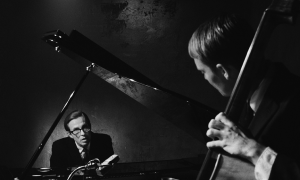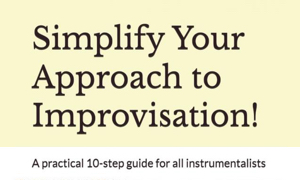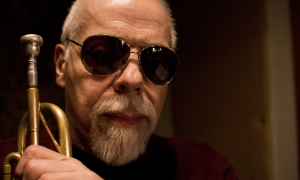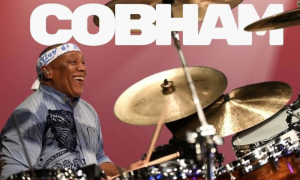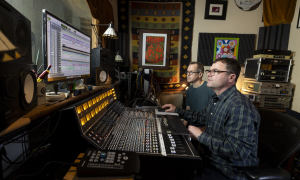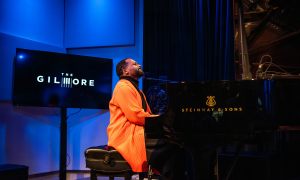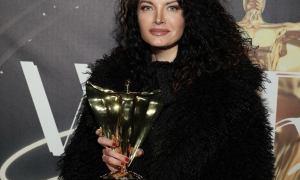The Future of Digital Music panel at Facebook's F8 conference was a bit disappointing due to the fact that they didn't actually address the future till the last question and that's when things got a bit more interesting. It was quick and fragmented but I've gathered some of the highlights.
The Future of Digital Music panel was moderated by Justin Osofsky, Director, Platform Partnerships at Facebook. Panelists included Troy Carter, Lady Gaga's manager, Daniel Ek, Spotify Founder and CEO, and Bob Pittman, who is now at Clear Channel but has a long history in music and media.
An early topic of the panel regarded shifts in how music is listened to and collected. Both Ek and Pittman tossed this around and considered the idea that curation has shifted from radio, which is in the hands of a few, to playlists, which are controlled by many.
Troy Carter was the only one who was getting a first look at the Timeline and the Open Graph apps and he seemed very impressed pointing out that social media was key to Lady Gaga building her fanbase. He also appreciated the discovery aspect of the apps and the ability of Timeline to store one's history of being a fan.
Pittman mentioned that iHeartRadio was created as part of moving away from Clear Channel's prior focus on transmitters with towers and towards having a presence on diverse channels. He feels that they should develop new products based on their own new ideas as well as those of others. Pittman also maintained that “people that can't stand chaotic environments probably shouldn't be in creative businesses."
Carter felt that artists should take their time building their brands and that the industry emphasis on how well a first album does was misdirected.
Ek suggested that we're in a “Golden Age" for new music with so many tools and platforms available. He also said that Spotify's development model is based on what they want to see as fans of music but that metrics allow them to rapidly evaluate innovation.
Pittman felt quick decision making is key even though he's in quite an established corporation. He also emphasized Clear Channel's need to think of themselves as a nimble startup company with huge assets.
Carter wants to keep experimenting with ways to deliver content. And a general agreement was voiced regarding the necessity of accepting and even embracing failure.
Carter also pointed to how the use of mobile devices has changed the concert going experience while Pitmann pointed to such developments as livestreaming of concerts and the use of social media to respond and participate as big changes.
In looking five years ahead, Daniel Ek brought up his recurring theme of developing alternatives to piracy. However, he built on that by pointing to the creative space that will be a result of musicians making more money and thus being able to spend more time in creative pursuits.
Troy Carter felt that the music industry would continue to move away from their initial response to filesharing, basically saying no, and towards creating new business models.
Pittman got on a roll towards the end relating to issues of control. He pointed to the increasing ability of artists to bypass traditional gatekeepers via social media and moves by the industry to embrace rather than control technology. He ended the panel with the statement that new tools are allowing artists to take control of creativity away from the forces of capital!
Though it's in the nature of such panels to feature soundbites and redundant speaking points, I wish they had started with the actual topic of the panel, The Future of Digital Music, and built from there. It felt like they were starting to get into more interesting territory at that point.
The Future of Digital Music panel was moderated by Justin Osofsky, Director, Platform Partnerships at Facebook. Panelists included Troy Carter, Lady Gaga's manager, Daniel Ek, Spotify Founder and CEO, and Bob Pittman, who is now at Clear Channel but has a long history in music and media.
An early topic of the panel regarded shifts in how music is listened to and collected. Both Ek and Pittman tossed this around and considered the idea that curation has shifted from radio, which is in the hands of a few, to playlists, which are controlled by many.
Troy Carter was the only one who was getting a first look at the Timeline and the Open Graph apps and he seemed very impressed pointing out that social media was key to Lady Gaga building her fanbase. He also appreciated the discovery aspect of the apps and the ability of Timeline to store one's history of being a fan.
Pittman mentioned that iHeartRadio was created as part of moving away from Clear Channel's prior focus on transmitters with towers and towards having a presence on diverse channels. He feels that they should develop new products based on their own new ideas as well as those of others. Pittman also maintained that “people that can't stand chaotic environments probably shouldn't be in creative businesses."
Carter felt that artists should take their time building their brands and that the industry emphasis on how well a first album does was misdirected.
Ek suggested that we're in a “Golden Age" for new music with so many tools and platforms available. He also said that Spotify's development model is based on what they want to see as fans of music but that metrics allow them to rapidly evaluate innovation.
Pittman felt quick decision making is key even though he's in quite an established corporation. He also emphasized Clear Channel's need to think of themselves as a nimble startup company with huge assets.
Carter wants to keep experimenting with ways to deliver content. And a general agreement was voiced regarding the necessity of accepting and even embracing failure.
Carter also pointed to how the use of mobile devices has changed the concert going experience while Pitmann pointed to such developments as livestreaming of concerts and the use of social media to respond and participate as big changes.
In looking five years ahead, Daniel Ek brought up his recurring theme of developing alternatives to piracy. However, he built on that by pointing to the creative space that will be a result of musicians making more money and thus being able to spend more time in creative pursuits.
Troy Carter felt that the music industry would continue to move away from their initial response to filesharing, basically saying no, and towards creating new business models.
Pittman got on a roll towards the end relating to issues of control. He pointed to the increasing ability of artists to bypass traditional gatekeepers via social media and moves by the industry to embrace rather than control technology. He ended the panel with the statement that new tools are allowing artists to take control of creativity away from the forces of capital!
Though it's in the nature of such panels to feature soundbites and redundant speaking points, I wish they had started with the actual topic of the panel, The Future of Digital Music, and built from there. It felt like they were starting to get into more interesting territory at that point.






